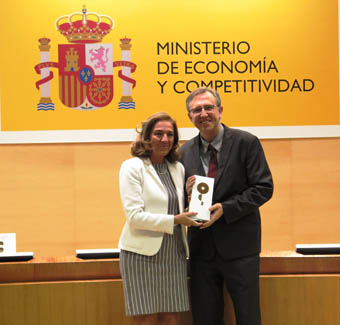
The director of the Institute for Molecular Science (ICMol) of the Universitat de València, professor Eugenio Coronado, received on Tuesday the accreditation of excellence ‘María de Maeztu’, granted to the Institute by the Spanish Ministry of Economy and Competitiveness. This distinction, along with ‘Severo Ochoa’ accreditations, are the biggest institutional awards to scientific investigation in Spain.
Coronado has received the accreditation from the State Secretary for R&D&I, Carmen Vela, in a ceremony that was held in Madrid, in the headquarter of the Ministry of Economy and Competitiveness, which was also attended by the Vice-principal for Research and Science Policy, Pilar Campins.
The accreditation is valid for four years and counts with a two million euros grant for this period.
With ‘Severo Ochoa’ and ‘María de Maeztu’ accreditations, the Ministry of Economy and Competitiveness earmarks 52 million euros for 15 institutes and research units selected by an international evaluation committee.
This time, 11 ‘Severo Ochoa’ accreditations and 4 ‘María de Maeztu’ have been granted. Besides ICMol, the Department of Information and Communication Technologies of Pompeu Fabra University, the Department of Particle Physics of the Centre for Energy, Environmental and Technological Research (CIEMAT), the Institute for Molecular Science of the Universitat de València, and the Institute of Environmental Science and Technology (ICTA) of the UAB have also received the ‘María de Maeztu’ accreditation. These units are added to the 6 that were accredited last year.
In addition, the three centres that have achieved the ‘Severo Ochoa’ award for the first time are the Basque Center on Cognition, Brain and Language, the Institute of Material Science of Barcelona of the Spanish Research Council (CSIC), and the Centre for Research in Agricultural Genomics (CRAG). The remaining eight centres that have received the excellence centre accreditation after achieving it in the first edition are (they are valid for four years and, therefore, the grants had finished): The Barcelona Supercomputing Center (BCS), the Institute of Mathematical Science (ICMAT), the Institute of Photonic Science (ICFFO), the IAT (Instituto de Astrofísica de Canarias), the Spanish National Cancer Research Centre Carlos III (CNIO), the Institute for Research in Biomedicine (IRB Barcelona), the Spanish National Centre for Cardiovascular Research Carlos III (CNIC) and the Barcelona Graduate School of Economics. All of them will receive an annual funding of one million euros for four years.
The requirements, levels of exigency, criteria and evaluation and selection procedures referred to quality and exigency of research and its results don’t set any difference between centres and units. Both ‘Severo Ochoa’ and ‘María de Maeztu’ have been selected for its trajectory for the past five years and its strategic programs after a rigorous assessment in which 115 first-rate and renowned prestige in its respective areas international researchers have participated. In this way, quality, level of excellence and impact of the research developed by both centres and units are guaranteed, establishing the differences just based on governance, structure and organizational and management principles, as in minimum critical mass required.
The ICMol
Founded in 2000, the Institute for Molecular Science of the Universitat de València, is a centre of excellence in chemistry and molecular nanoscience. Its scientific objectives focus on areas like design and the synthesis of functionalized molecules, the supramolecular associations and the molecular materials with interesting physical or chemical properties. The fields of application go from molecular magnetism and molecular electronics to nanotechnology and biomedicine.
More than 160 people, distributed in eight scientific teams, are researchers in this centre run by the Inorganic Chemistry professor Eugenio Coronado.
The ICMol participates in the development of different European projects, within the EU framework programme, and counts with an Advanced Grant and a Consolidator Grant from the European Research Council. These projects are framed within the fields of nanoscience, energy and information and communication sciences. Specifically, they focus on the development of particles, materials and devices of interest for magnetism, electronics and molecular spintronics (Spin valves, magnetic qubits, unimolecular transistors, OLED, molecule solar cells, etc.)
On the other side, it coordinates projects of the National Programme CONSOLIDER INGENIO 2010: NANOMOL about molecular nanoscience and SUPRAMED about biomedical applications of supramolecular chemistry. In the Valencain Country, it develops six projects of the PROMETEO Programme in every areas in which ICMol is active.
Last update: 2 de february de 2016 17:32.
News release



















